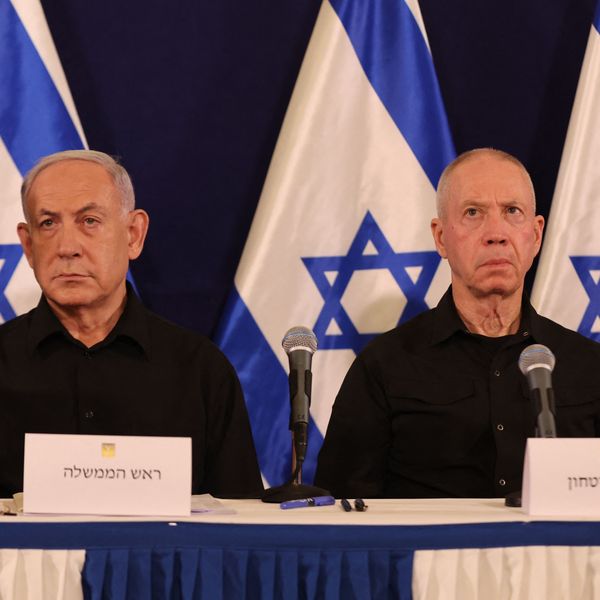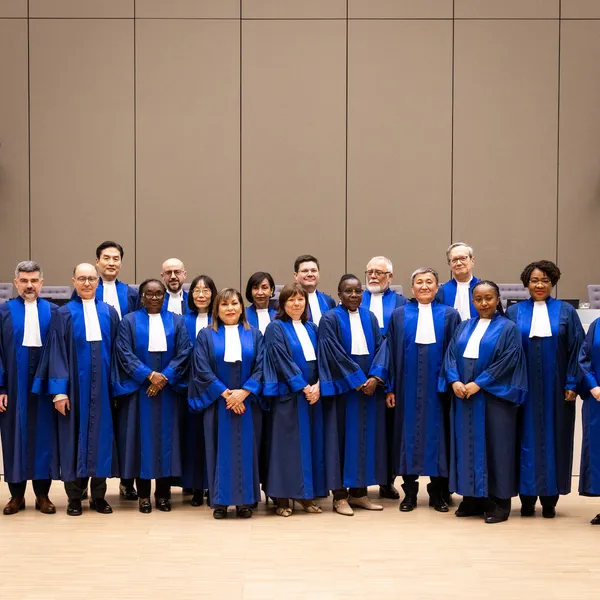'Where Is Justice'? Top UN Court Rejects Marshall Islands Nuke Case
International Court of Justice rejects three disarmament cases against U.K., Pakistan, and India, claiming it did not have jurisdiction
The International Court of Justice (ICJ) on Wednesday rejected three nuclear disarmament cases filed by the Marshall Islands against the United Kingdom, Pakistan, and India, on the grounds that the court does not have the jurisdiction to handle them.
The ICJ, the United Nations' highest court, ruled 9-8 the plaintiffs did not prove that a legal argument existed between the island country and the three nuclear nations before the case was filed in 2014. The Marshall Islands said the states had failed to fulfill their disarmament obligations under the 1968 Nuclear Non-Proliferation Treaty (NPT).
According to the Associated Press, in the case against the U.K., the panel was deadlocked until ICJ President Ronny Abraham cast a vote in support of the nuclear powers. In Pakistan and India's cases, the margin was 9-7.
"If the ICJ fails to properly consider their case, where do the Marshallese go to seek justice?" said Kate Hudson, general secretary of the U.K.-based Campaign for Nuclear Disarmament.
"The U.K. signed the NPT almost fifty years ago, committing to enter negotiations to get rid of its nuclear weapons. Instead, the government is in the process of spending at least PS205 billion on new nuclear weapons--with the metal cutting tragically starting today," Hudson continued. "A mechanism is needed to ensure compliance with this international treaty, as currently the U.K. is dodging its obligations."
The initial case was filed against nine states in total--the U.K., India, and Pakistan, as well as the U.S., France, Russia, China, North Korea, and Israel--but the other six never made it to the preliminary hearings.
The Marshall Islands has vested interest in disarmament because the tiny Pacific nation served as an unwilling nuclear testing ground for the U.S. from 1946 to 1958. The so-called "Bravo" hydrogen bomb, tested at Bikini Atoll, was estimated to be 1,000 times bigger than the atomic bomb dropped on Hiroshima.
Many native residents were forced to flee their lands and thousands were exposed to radioactive material as a result of these tests. Former Marshall Islands foreign minister Tony deBrum testified at ICJ hearings in March that he witnessed nuclear tests as a nine-year-old boy.
"The entire sky turned blood red," he told the panel at the time. "Many died, or suffered birth defects never before seen and cancers as a result of contamination."
"Several islands in my country were vaporized and others are estimated to remain uninhabitable for thousands of years," he said.
Phon van den Biesen, a lawyer for the Marshall Islands, told the AP after the decision, "If the court keeps creating this sort of threshold, what is the court for? It's a dispute that is clear to all of the world except for eight judges here."
Hudson added, "It is no wonder that [the Marshall Islands] want to see an end to nuclear weapons."
An Urgent Message From Our Co-Founder
Dear Common Dreams reader, The U.S. is on a fast track to authoritarianism like nothing I've ever seen. Meanwhile, corporate news outlets are utterly capitulating to Trump, twisting their coverage to avoid drawing his ire while lining up to stuff cash in his pockets. That's why I believe that Common Dreams is doing the best and most consequential reporting that we've ever done. Our small but mighty team is a progressive reporting powerhouse, covering the news every day that the corporate media never will. Our mission has always been simple: To inform. To inspire. And to ignite change for the common good. Now here's the key piece that I want all our readers to understand: None of this would be possible without your financial support. That's not just some fundraising cliche. It's the absolute and literal truth. We don't accept corporate advertising and never will. We don't have a paywall because we don't think people should be blocked from critical news based on their ability to pay. Everything we do is funded by the donations of readers like you. Will you donate now to help power the nonprofit, independent reporting of Common Dreams? Thank you for being a vital member of our community. Together, we can keep independent journalism alive when it’s needed most. - Craig Brown, Co-founder |
The International Court of Justice (ICJ) on Wednesday rejected three nuclear disarmament cases filed by the Marshall Islands against the United Kingdom, Pakistan, and India, on the grounds that the court does not have the jurisdiction to handle them.
The ICJ, the United Nations' highest court, ruled 9-8 the plaintiffs did not prove that a legal argument existed between the island country and the three nuclear nations before the case was filed in 2014. The Marshall Islands said the states had failed to fulfill their disarmament obligations under the 1968 Nuclear Non-Proliferation Treaty (NPT).
According to the Associated Press, in the case against the U.K., the panel was deadlocked until ICJ President Ronny Abraham cast a vote in support of the nuclear powers. In Pakistan and India's cases, the margin was 9-7.
"If the ICJ fails to properly consider their case, where do the Marshallese go to seek justice?" said Kate Hudson, general secretary of the U.K.-based Campaign for Nuclear Disarmament.
"The U.K. signed the NPT almost fifty years ago, committing to enter negotiations to get rid of its nuclear weapons. Instead, the government is in the process of spending at least PS205 billion on new nuclear weapons--with the metal cutting tragically starting today," Hudson continued. "A mechanism is needed to ensure compliance with this international treaty, as currently the U.K. is dodging its obligations."
The initial case was filed against nine states in total--the U.K., India, and Pakistan, as well as the U.S., France, Russia, China, North Korea, and Israel--but the other six never made it to the preliminary hearings.
The Marshall Islands has vested interest in disarmament because the tiny Pacific nation served as an unwilling nuclear testing ground for the U.S. from 1946 to 1958. The so-called "Bravo" hydrogen bomb, tested at Bikini Atoll, was estimated to be 1,000 times bigger than the atomic bomb dropped on Hiroshima.
Many native residents were forced to flee their lands and thousands were exposed to radioactive material as a result of these tests. Former Marshall Islands foreign minister Tony deBrum testified at ICJ hearings in March that he witnessed nuclear tests as a nine-year-old boy.
"The entire sky turned blood red," he told the panel at the time. "Many died, or suffered birth defects never before seen and cancers as a result of contamination."
"Several islands in my country were vaporized and others are estimated to remain uninhabitable for thousands of years," he said.
Phon van den Biesen, a lawyer for the Marshall Islands, told the AP after the decision, "If the court keeps creating this sort of threshold, what is the court for? It's a dispute that is clear to all of the world except for eight judges here."
Hudson added, "It is no wonder that [the Marshall Islands] want to see an end to nuclear weapons."
The International Court of Justice (ICJ) on Wednesday rejected three nuclear disarmament cases filed by the Marshall Islands against the United Kingdom, Pakistan, and India, on the grounds that the court does not have the jurisdiction to handle them.
The ICJ, the United Nations' highest court, ruled 9-8 the plaintiffs did not prove that a legal argument existed between the island country and the three nuclear nations before the case was filed in 2014. The Marshall Islands said the states had failed to fulfill their disarmament obligations under the 1968 Nuclear Non-Proliferation Treaty (NPT).
According to the Associated Press, in the case against the U.K., the panel was deadlocked until ICJ President Ronny Abraham cast a vote in support of the nuclear powers. In Pakistan and India's cases, the margin was 9-7.
"If the ICJ fails to properly consider their case, where do the Marshallese go to seek justice?" said Kate Hudson, general secretary of the U.K.-based Campaign for Nuclear Disarmament.
"The U.K. signed the NPT almost fifty years ago, committing to enter negotiations to get rid of its nuclear weapons. Instead, the government is in the process of spending at least PS205 billion on new nuclear weapons--with the metal cutting tragically starting today," Hudson continued. "A mechanism is needed to ensure compliance with this international treaty, as currently the U.K. is dodging its obligations."
The initial case was filed against nine states in total--the U.K., India, and Pakistan, as well as the U.S., France, Russia, China, North Korea, and Israel--but the other six never made it to the preliminary hearings.
The Marshall Islands has vested interest in disarmament because the tiny Pacific nation served as an unwilling nuclear testing ground for the U.S. from 1946 to 1958. The so-called "Bravo" hydrogen bomb, tested at Bikini Atoll, was estimated to be 1,000 times bigger than the atomic bomb dropped on Hiroshima.
Many native residents were forced to flee their lands and thousands were exposed to radioactive material as a result of these tests. Former Marshall Islands foreign minister Tony deBrum testified at ICJ hearings in March that he witnessed nuclear tests as a nine-year-old boy.
"The entire sky turned blood red," he told the panel at the time. "Many died, or suffered birth defects never before seen and cancers as a result of contamination."
"Several islands in my country were vaporized and others are estimated to remain uninhabitable for thousands of years," he said.
Phon van den Biesen, a lawyer for the Marshall Islands, told the AP after the decision, "If the court keeps creating this sort of threshold, what is the court for? It's a dispute that is clear to all of the world except for eight judges here."
Hudson added, "It is no wonder that [the Marshall Islands] want to see an end to nuclear weapons."

